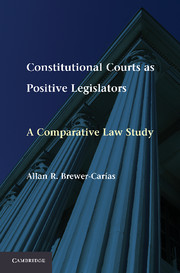Book contents
PART ONE - CONSTITUTIONAL COURTS AS POSITIVE LEGISLATORS IN COMPARATIVE LAW
Published online by Cambridge University Press: 04 August 2017
Summary
At the beginning of the twentiest century, Hans Kelsen, in his very well-known article “La garantie juridictionnelle de la constitution (La justice constitutionnelle),” published in 1928, in the Revue du droit public et de la science politique en France et a l'étranger, began to write for non-German-speaking readers about constitutional courts as “negative legislators.” As Kelsen was one of the most important constructors of modern public law of the twentieth century, it is indeed impossible to write about the opposite assertion – on constitutional courts as positive legislators – without referring to his thoughts on the matter.
In his article, while sharing his experience on the establishment and functioning of the Constitutional Court of Austria in 1920, conceived of as an important part of the concentrated system of judicial review that he had introduced for the first time in Europe, Kelsen began to explain the role of such constitutional organs established outside of the judicial branch of government, but with jurisdictional powers to annul statutes they deemed unconstitutional.
The Austrian system, which was established the same year as that in Czechoslovakia, according to Kelsen's own ideas, sharply contrasted with, at that time, the already well-established and well-developed diffuse system of judicial review adopted in the United States, where for more than a century, courts and the Supreme Court had already developed a very active role as constitutional judges.
- Type
- Chapter
- Information
- Constitutional Courts as Positive LegislatorsA Comparative Law Study, pp. 5 - 12Publisher: Cambridge University PressPrint publication year: 2011
- 1
- Cited by

